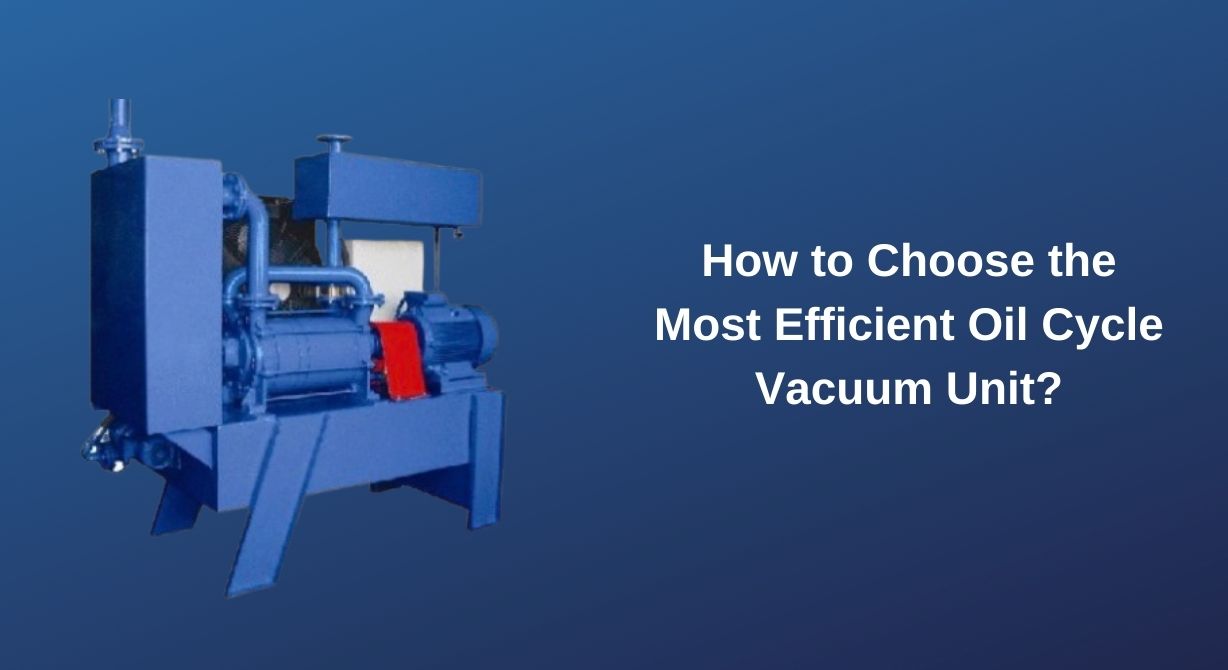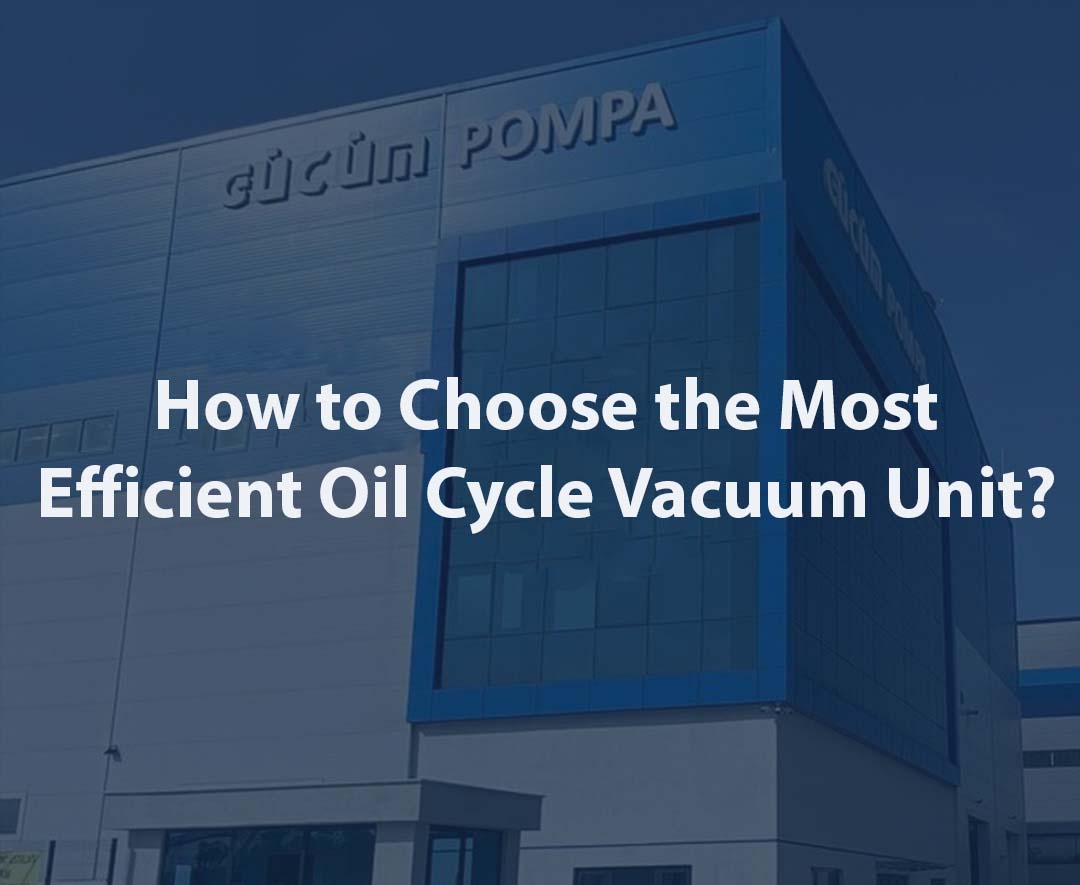How to Choose the Most Efficient Oil Cycle Vacuum Unit?
Contents
- How to Choose the Most Efficient Oil Cycle Vacuum Unit?
- Working Principle
- Areas of Use
- Advantages
- Maintenance and Durability
- Comparison of Oil Cycle Vacuum Units and Dry Vacuum Units
- Criteria for Choosing the Right Vacuum Unit
- Energy Efficiency and Environmental Impacts
- Oil Usage and Filtration Processes
- Future in Industry
How to Choose the Most Efficient Oil Cycle Vacuum Unit?
Vacuum systems form the cornerstone of industrial processes. Oil cycle vacuum units are indispensable, especially in applications that require high vacuum levels and where precision is important. However, choosing the most efficient oil cycle vacuum unit can be a complicated process. There are many factors you need to consider when choosing. A good choice will not only increase the efficiency of your business but also help reduce costs in the long run.
The first step to choosing the most efficient vacuum unit is to determine the needs of your business. You should consider what vacuum levels you need, what industrial processes you will use it in, and long-term maintenance requirements. You also need to consider the vacuum unit's energy efficiency, durability, and environmental impacts. Properly analyzing these factors will help you choose the most efficient vacuum system.
Working Principle
Oil cycle vacuum units evacuate air and gases from the vacuum chamber via mechanical pumps, thereby creating low pressure. In this system, oil is used to reduce the friction of moving parts inside the pump, thus preventing wear of pump components. At the same time, the oil increases the air tightness inside the pump, making the vacuum more stable and efficient. Oil cycle vacuum units work in a continuous cycle, filtering and cleaning some of the oil and conveying it back to the pump.
Oil cycle systems are extremely efficient in terms of performance because the extra seal provided by the oil allows much lower vacuum levels to be achieved. Since oil pump systems have high temperature resistance, there is no loss of performance even during uninterrupted operation. These features ensure high efficiency and security in industrial systems.
Areas of Use
Oil cycle vacuum units are widely used in many industrial areas. These units are required for vacuum molding processes, especially in the plastic and rubber industry. It is frequently preferred in the food industry, especially in packaging and sterilization processes. In medical and laboratory fields, it is used for analytical devices and sterilization equipment. Oil cycle vacuum systems are also of great importance in metal processing and electronics production.
It is quite common to use such vacuum units in sensitive production processes that require high vacuum. The stable vacuum level provided by oil cycle vacuum systems forms the basis of quality production. Therefore, choosing the right vacuum system is critical to the success of industrial processes.
Advantages
One of the most important advantages of oil cycle vacuum units is their ability to reach high vacuum levels. By reducing friction inside the pump, oil prevents wear and ensures that components last longer. Such systems offer a more stable operating environment than dry vacuum pumps and can achieve lower vacuum levels. Oil cycle systems prevent wear and mechanical failures thanks to continuous lubrication, which reduces maintenance costs.
ANDNetwork loop vacuum units have high temperature resistance and can operate uninterruptedly for a long time. This feature is one of the reasons why vacuum units that can withstand the harsh conditions of industrial environments are preferred. These systems offer significant cost advantages to businesses in the long term, thanks to their longer lifespan.
Maintenance and Durability
In order for oil cycle vacuum units to work efficiently, regular maintenance is required. Changing the oil at regular intervals, cleaning the filtration systems and performing in-pump checks increases the performance of the system. Thanks to these maintenances, the vacuum unit is ensured to operate more efficiently for a longer time. Oil cycle systems have high durability when properly maintained and can be used safely in industrial processes.
The use of quality oil increases the durability of such systems. Regular maintenance and use of quality oil prolongs both the performance and life of the system. The effectiveness of filtering systems ensures that the oil remains clean at all times, thus making long-term use of the system possible. When these maintenance processes are not neglected, malfunctions can be prevented by ensuring that the system operates efficiently.
Comparison of Oil Cycle Vacuum Units and Dry Vacuum Units
The main difference between oil cycle vacuum units and dry vacuum units is the use of oil. Dry vacuum units may be advantageous in terms of environmental friendliness, but oil cycle systems allow lower pressure to be achieved and more stable operation. While oil cycle systems provide more efficient results in industrial applications requiring high vacuum, dry vacuum systems are generally used at low vacuum levels.
Oil cycle systems are preferred especially in applications requiring high precision. Dry vacuum pumps can often have shorter lifespans and maintenance needs may be more frequent. Oil cycle vacuum units provide reliable solutions that work efficiently for longer periods of time and provide uninterrupted and stable vacuum in industrial processes.
Criteria for Choosing the Right Vacuum Unit
When choosing a vacuum unit, you should consider several important criteria to determine a model that suits your needs. First, the targeted vacuum level must be determined and analyzed for which industrial processes the system is suitable. In addition, energy efficiency, maintenance costs, durability and environmental impacts should also be taken into consideration. The vacuum unit to be selected must suit the needs of your business and long-term cost targets.
To choose the most suitable vacuum unit, factors such as energy consumption and efficiency should be taken into account. Factors such as maintenance frequency, oil change intervals and filtration requirements should also be evaluated before selecting the unit. Analyzing these elements correctly will ensure that your business has an efficient and sustainable vacuum unit in the long run.
Energy Efficiency and Environmental Impacts
Oil cycle vacuum units offer significant advantages in terms of energy efficiency when used correctly. However, the oil used must be changed regularly and disposed of in an environmentally friendly manner. New generation vacuum systems are developed with technologies that consume less energy and cause less harm to the environment. These developments both provide energy savings to businesses and reduce environmental impact.
The use of environmentally friendly oils and low energy consumption systems is becoming increasingly important for businesses aiming for sustainable production. Therefore, energy efficiency and environmental impacts are important factors to consider when choosing a vacuum unit. In order to provide both economic and environmental benefits, environmentally friendly vacuum systems should be preferred.
Oil Usage and Filtration Processes
Oil is a critical component that directly affects the performance of vacuum systems. The use of quality oil prevents wear by reducing friction within the pump and increases the efficiency of the system. In oil cycle vacuum units, the oil must be filtered and cleaned regularly. The effectiveness of filtration systems ensures the long life of the system and ensures that the oil remains clean at all times.
Cleaning the oil in oil cycle systems is also of great importance in terms of energy efficiency. The accumulation of impurities in the oil reduces the efficiency of the pumps and increases energy consumption. Therefore, proper operation of oil filtration systems keeps the performance of the vacuum unit high and saves money for your business.
Future in Industry
Oil cycle vacuum units are developing rapidly in the industrial field in search of more efficient and environmentally friendly solutions. In the future, vacuum systems with higher efficiency, lower energy consumption and less harm to the environment are expected to become widespread. These systems will reduce the environmental impact of businesses in the long term by enabling industrial processes to become more sustainable. New technologies will offer longer-lasting vacuum units that require less maintenance and will increase efficiency in the industry.
Industrial vacuum systems will become more intelligent and connected in the future, allowing remote monitoring and maintenance. This will enable businesses to manage maintenance costs more efficiently. As a result, oil cycle vacuum units are expected to provide higher efficiency, durability and environmental benefits with technological developments.
